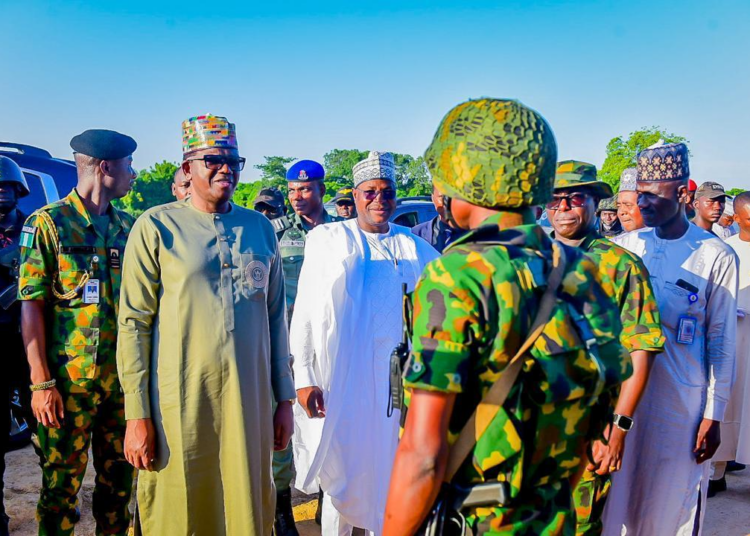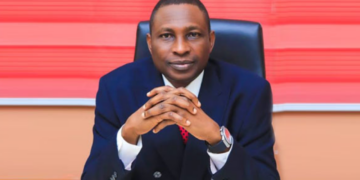At 56, Dr Bello Matawalle, Nigeria’s Minister of State for Defence, exudes great commitment to the nation’s security that belies his age. For him, age is never a disadvantage in fighting insecurity. To him, it is not a matter of years spent, but more about the numbers of battles fought and victories secured. He has proven overtime with results that his appointment by President Bola Ahmed Tinubu was not a mere political maneuver but a calculated decision rooted in the President’s deep understanding of Matawalle’s fighting spirit. Unlike many individuals who are contented with desk-bound strategies and boardroom deliberations only, Matawalle took the fight against insecurity to the very heart of the battlefield.
However, beneath his seemingly and unassuming demeanour lies a steel-like resilience, a heart of a warrior that is wrapped in a civilian garb. His frail figure, deceptive in appearance, is immensely fortified with an unyielding resolve that has made significant strides in the war against terrorism, banditry, and insurgency.
From the onset of his appointment, Matawalle wasted no time in translating rhetoric into action, going beyond the comfort of Abuja’s bureaucratic confines, and marching into the treacherous zones where the nation’s enemies thrived.
For the record, Matawalle’s proactive leadership style shattered the norm of past administrations. Instead of merely giving orders from the comfort of his ministerial chambers, he immersed himself in the battlefield, inspiring soldiers, evaluating war plans directly, and proving that leadership is a deed rather than a title. Some doubters thought it was merely a show when he wore full military fatigues, but those who understood the psychological impact of leadership by example recognised the gravity of his actions. An unwavering loyalty is inspired by a commander who shares the battlefield with his troops, and Matawalle did just that.
At the ticking of time, his efforts have been yielding remarkable successes in Nigeria’s unrelenting war against terror. The operational successes recorded under his tenure have not only decimated the ranks of insurgents, but have also reclaimed territories once overrun by bandits and terrorists. His impact is not theoretical; it is tangible, measurable, and evident in the numbers.
Under Matawalle’s leadership, Nigeria’s defence apparatus has undergone a renewed surge of effectiveness, marked by well-coordinated military offensives that have struck at the core of terrorist enclaves. The Nigerian Army, in synergy with the Air Force, executed precise airstrikes and ground assaults on insurgent strongholds in the North-West and North-Central regions. These efforts resulted in the neutralisation of notorious warlords, dismantling of terror cells, and significant recovery of arms and ammunition.
The precise airstrike that destroyed terrorist hideouts in Zurmi, Gusau, and Maradun Local Government Areas, severely impairing their ability to operate, was one of the noteworthy successes. In a bloody gunfight, the country also saw the defeat of the vicious rebel, Boderi Isyaku. His and his fighters’ deaths made it very evident that Nigeria will no longer serve as a haven for criminals. An array of weapons, including AK-47 rifles, hundreds of rounds of ammunition, and advanced communication devices, was successfully seized by the troops.
However, the tally of terrorist commanders neutralised within the first quarter of 2024 is staggering. The director, defence media operations, Maj. Gen. Edward Buba, disclosed that among those taken down were Abu Bilal Minuki, alias Abubakar Mainok, the head of IS-Al Furqan Province (ISGS and ISWAP), and Haruna Isiya Boderi, both eliminated on February 21. Others include Kachallah Damina, who was neutralized on March 24, along with over 50 combatants, as well as several high-profile warlords such as Kachallah Alhaji Dayi, Kachallah Idi (Namaidaro), and Kachallah Azarailu (Farin-Ruwa), among many others.
The operational result in the first quarter of year 2024 (January to March) speak volumes. It’s in record that 2,351 terrorists were neutralized, 2,308 arrests made, 1,241 kidnapped hostages rescued, 2,847 weapons and 58,492 rounds of ammunition recovered, and N20.3 billion worth of stolen crude oil were intercepted in the hands of criminal elements.
Further military operations between July and September 2024 sustained the tempo of victory. In figures, 1,937 terrorists eliminated, 2,782 arrests were effected, 1,854 hostages freed, 1,304 weapons and 43,347 rounds of ammunition seized, and N13.08 billion worth of stolen crude recovered.
The continued offensive yielded the deaths of additional terror leaders, including Munzir Arika, Sani Dilla (Dan Hausawan Jubillaram), Ameer Modu, Matawal Bitrus, and Ibn Kasir, among numerous others. These successes were not mere coincidences; they were the results of synchronised strikes and well-executed military intelligence.
Leadership in defense is not about rhetoric or empty promises, it is about the courage to act decisively in moments of national crisis. Matawalle epitomizes this brand of leadership. While some leaders would have remained ensconced in the relative safety of policy chambers, Matawalle chose the road less traveled, one marked by dust, blood, and bullets. His presence on the frontline served as a morale booster for troops, reinforcing the belief that the government was not just issuing commands, but actively involved in the war against terror.
Moreover, his bold approach was one that shattered bureaucratic inertia, ushering in an era of relentless pursuit of national security objectives. Matawalle was not content with just simply speaking about the problem; he embodied the solution. With unwavering audacity, he took the fight to the terrorists, declaring war against them, and demonstrating that Nigeria would no longer cower in the face of insurgency.
Matawalle’s influence is reminiscent of great military leaders who realised that strategy, willpower, and a readiness to face the enemy head-on are more important factors in winning a war than diplomacy. Under his leadership, Nigeria’s military is now far more operationally prepared, and terrorists who formerly roamed with impunity now flee in terror.
President Bola Ahmed Tinubu’s choice of Matawalle as Minister of State for Defence was an inspired decision, one that has been vindicated by the string of military successes recorded under his watch. Truly, it takes a leader of foresight to recognise and deploy capable hands, and in Matawalle, Tinubu found a warrior-statesman willing to bear the brunt of Nigeria’s most pressing security challenges.
For too long, Nigerians have yearned for leaders who do more than make pronouncements, leaders who translate words into action, who see national service not as a privilege but as a duty. Matawalle fits this mold seamlessly. His efforts have reassured a nation once teetering on the brink of despair, proving that with the right leadership, insecurity can be tackled head-on.
However, while much progress has been made, the battle is still far from over. The Matawalle-effect has undoubtedly pushed the terrorists factions to lurk in dark corners, seeking opportunities to strike. But with Matawalle at the helm, there is renewed confidence that these elements will be systematically dismantled.
Matawalle’s legacy as Nigeria’s Civilian General is already engraved in the annals of history. He has demonstrated that leadership is not about titles but about the level of impact made. His track record so far is an evidence to what is possible when leadership meets action. The war against terrorism has found a fearless champion, and Nigeria stands poised to reclaim its long-lost peace. Some 8 months later, we can celebrate a national hero, and a general who reported for duty due to the successes recorded on the home front.
It is now obvious that President Tinubu’s decision to entrust Matawalle with this important responsibility was never a mistake, rather, it was a masterstroke. While the battle against insecurity rages on, one thing remains clear: Bello Matawalle is relentless, very active, and still at work, and Nigeria is all the better for it.
– Ibrahim, a public affairs analyst, writes from Abuja





